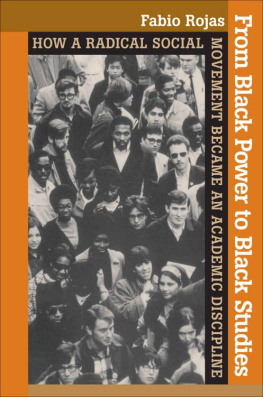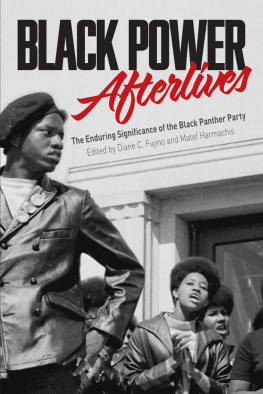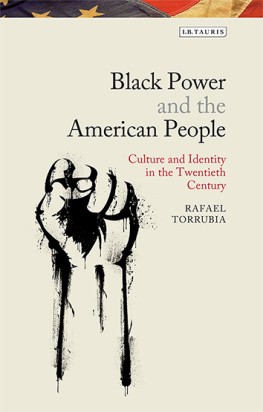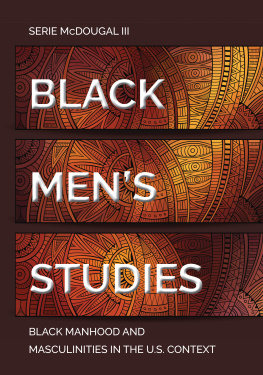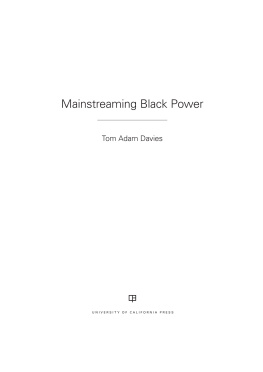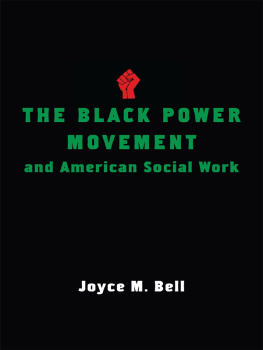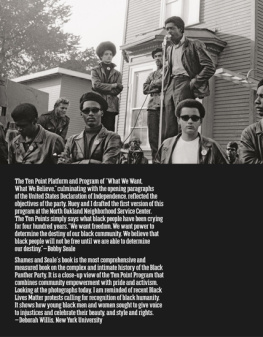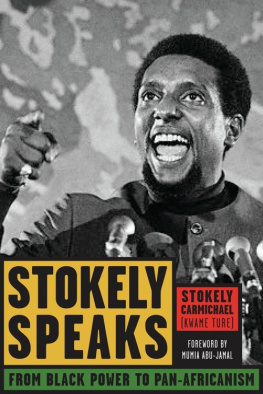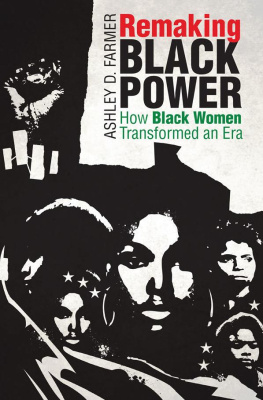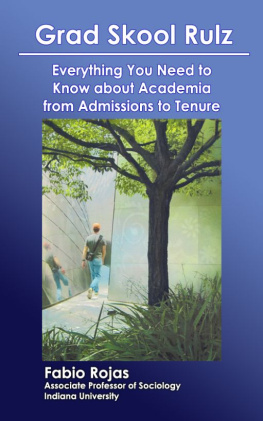Fabio Rojas - From Black Power to Black Studies
Here you can read online Fabio Rojas - From Black Power to Black Studies full text of the book (entire story) in english for free. Download pdf and epub, get meaning, cover and reviews about this ebook. year: 2010, publisher: Johns Hopkins University Press, genre: Politics. Description of the work, (preface) as well as reviews are available. Best literature library LitArk.com created for fans of good reading and offers a wide selection of genres:
Romance novel
Science fiction
Adventure
Detective
Science
History
Home and family
Prose
Art
Politics
Computer
Non-fiction
Religion
Business
Children
Humor
Choose a favorite category and find really read worthwhile books. Enjoy immersion in the world of imagination, feel the emotions of the characters or learn something new for yourself, make an fascinating discovery.
- Book:From Black Power to Black Studies
- Author:
- Publisher:Johns Hopkins University Press
- Genre:
- Year:2010
- Rating:4 / 5
- Favourites:Add to favourites
- Your mark:
- 80
- 1
- 2
- 3
- 4
- 5
From Black Power to Black Studies: summary, description and annotation
We offer to read an annotation, description, summary or preface (depends on what the author of the book "From Black Power to Black Studies" wrote himself). If you haven't found the necessary information about the book — write in the comments, we will try to find it.
From Black Power to Black Studies — read online for free the complete book (whole text) full work
Below is the text of the book, divided by pages. System saving the place of the last page read, allows you to conveniently read the book "From Black Power to Black Studies" online for free, without having to search again every time where you left off. Put a bookmark, and you can go to the page where you finished reading at any time.
Font size:
Interval:
Bookmark:
From Black Power to Black Studies
How a Radical Social Movement
Became an Academic Discipline
Fabio Rojas

2007 The Johns Hopkins University Press
All rights reserved. Published 2007
Printed in the United States of America on acid-free paper
Johns Hopkins Paperback edition, 2010
9 8 7 6 5 4 3 2 1
The Johns Hopkins University Press
2715 North Charles Street
Baltimore, Maryland 21218-4363
www.press.jhu.edu
The Library of Congress has catalogued the hardcover edition of this book as follows:
Rojas, Fabio, 1972
From Black Power to Black studies : how a radical social movement
became an academic discipline / Fabio Rojas.
p. cm.
Includes bibliographical references and index.
ISBN-13:978-0-8018-8619-5 (hardcover : alk. paper)
ISBN-10: 0-8018-8619-8 (hardcover : alk. paper)
1. African AmericansStudy and teachingHistory20th century.
2. BlacksStudy and teachingHistory20th century. I. Title.
E184.7.R65 2007
305.896073007dc22
2006037957
A catalog record for this book is available from the British Library.
ISBN 13: 978-0-8018-9825-9
ISBN 10: 0-8018-9825-0
To my family, past, present, and future
Figures
Tables
I first became aware of black studies as an undergraduate at the University of California at Berkeley in the early 1990s. At the time, students were pushing for a multiculturalism requirement. The purpose was to instill in undergraduates a working knowledge of the history and culture of various American ethnic groups. In response to student activism, Berkeley became one of the first major universities to require undergraduates to take a course addressing multiple American ethnic groups. Students could take ethnic studies courses to satisfy the requirement, which drew my attention to the fact that Berkeley had had programs such as black studies for decades.
Black studies did not cross my mind again for years, until I enrolled in the sociology doctoral program at the University of Chicago. During my second year, I joined a small group study course headed by Charles Bidwell and Robert Dreeben, two sociologists of education who have spent decades thinking about how schools and colleges are organized. One of the readings was Bourdieu and Passerons Reproduction in Education, Culture, and Society. Their main point is simple: an educational institutions role is to re-create the status order or class structure that already characterizes society. This perspective has a long pedigree in the Western intellectual tradition, going back to Paolo Freire, Emile Durkheim, and Karl Marx.
This analysis struck me as wrong, or at the very least seriously incomplete, and Berkeley provided a great counterexample. Rather than just being a place where elites came to study and reinforce their position, Berkeley attracted a great deal of conflict. It is true that schools certify social elites, but it is also true that schools are the focus of political disputes. Simply walk through Berkeleys Sproul Plaza on a busy day early in the fall semester. A dozen groups of all stripes can be seen complaining about some issue or another. Many of them want new courses taught and new professors hired. Students frequently organize protests for ethnic studies.
I came to realize that many political movements target institutions of higher education. Conservative Christians want creationism taught; multiculturalists want ethnic studies; homosexual activists want gay and lesbian studies; progressives want social work training; and evangelicals have opened their own colleges. In the post-9/11 era, we have become acutely aware that radical Islamists target college students in Europe and run their own religious colleges in Afghanistan and Iran. Higher education does not seem to be completely about reinforcing the status quo. In fact, the highly visible and public position of universities invites dissent and conflict.
My view is that American higher education goes through phases of conflict and consensus, as does any social institution. Much of the time, schools reproduce the status quo, just as Bourdieu and Passeron said. Colleges, by themselves, do not change fundamental social and economic realities. The wealthiest families are the ones most able to take advantage of Americas outstanding colleges and universities. As a wistful Bill Murray tells a chapel full of wealthy private school boys in the film Rushmore, You were born rich, and youre going to stay rich. But talented people of humble origins often scramble their way up to good colleges and graduate schools; an ambitious Bill Clinton made it to Georgetown and Oxford. Americas relatively open higher education system means that the talented and the wealthy will be concentrated in a relatively few schools, creating a future society with leaders who started their careers in the same institutions.
At the same time, the openness of Americas colleges encourages them to be the focus of political struggles and social change. People can complain and demand things. Every university executive knows that part of the job is fending off political attacks. This is not to say that complainers will always be heard, but outsiders can affect university agendas in many ways. People can literally show up and protest. They can influence students and professors. They can lobby trustees and the political appointees who govern public universities. They can give money to a university so that a new research center will be opened or a chair in their favorite subject will be established. Universities can even become involved in electoral politics, such as when Ward Connerly targeted the University of California through an anti-affirmative action referendum. All the direct and indirect opportunities for influence mean that the university becomes a place where interests clash and politics comes to the forefront. Rather than just a rubber stamp for people on the way to success, the university is often the stage for intense political struggle.
That is how I came back to thinking about black studies. I realized that much more could be said about black studies and how it emerged from the movements of the 1960s. One could thoroughly explore how politics permeates the university and disrupts the status quo. There are important questions about how bureaucracies respond to social movements that need answers. There were quite a few historical accounts of ethnic studies, and black studies in particular, but few researchers had considered how black studies was the outcome of movement politics and how the field was assimilated into the higher education system. I was surprised to find that, aside from occasional essays by professors about the state of black studies programs and occasional policy reports by the National Council for Black Studies, very little writing had a sustained focus on black studies development as an educational institution. In short, black studies provided an opportunity to examine how universities responded to serious political challenges and developed new academic disciplines. This book should be considered a very skeptical response to Bourdieu and Passeron.
This leads to my reasons for selecting black studies as my professional concern. It is said that ones dissertation topic determines ones academic identity, so it is best to pick wisely. This is surely an exaggeration, but it contains a kernel of truth. The dissertation is the first serious, long-term research project for most academics. Job placement and initial publication records depend on having an interesting and competently executed dissertation. So why did I choose this topic?
Next pageFont size:
Interval:
Bookmark:
Similar books «From Black Power to Black Studies»
Look at similar books to From Black Power to Black Studies. We have selected literature similar in name and meaning in the hope of providing readers with more options to find new, interesting, not yet read works.
Discussion, reviews of the book From Black Power to Black Studies and just readers' own opinions. Leave your comments, write what you think about the work, its meaning or the main characters. Specify what exactly you liked and what you didn't like, and why you think so.

